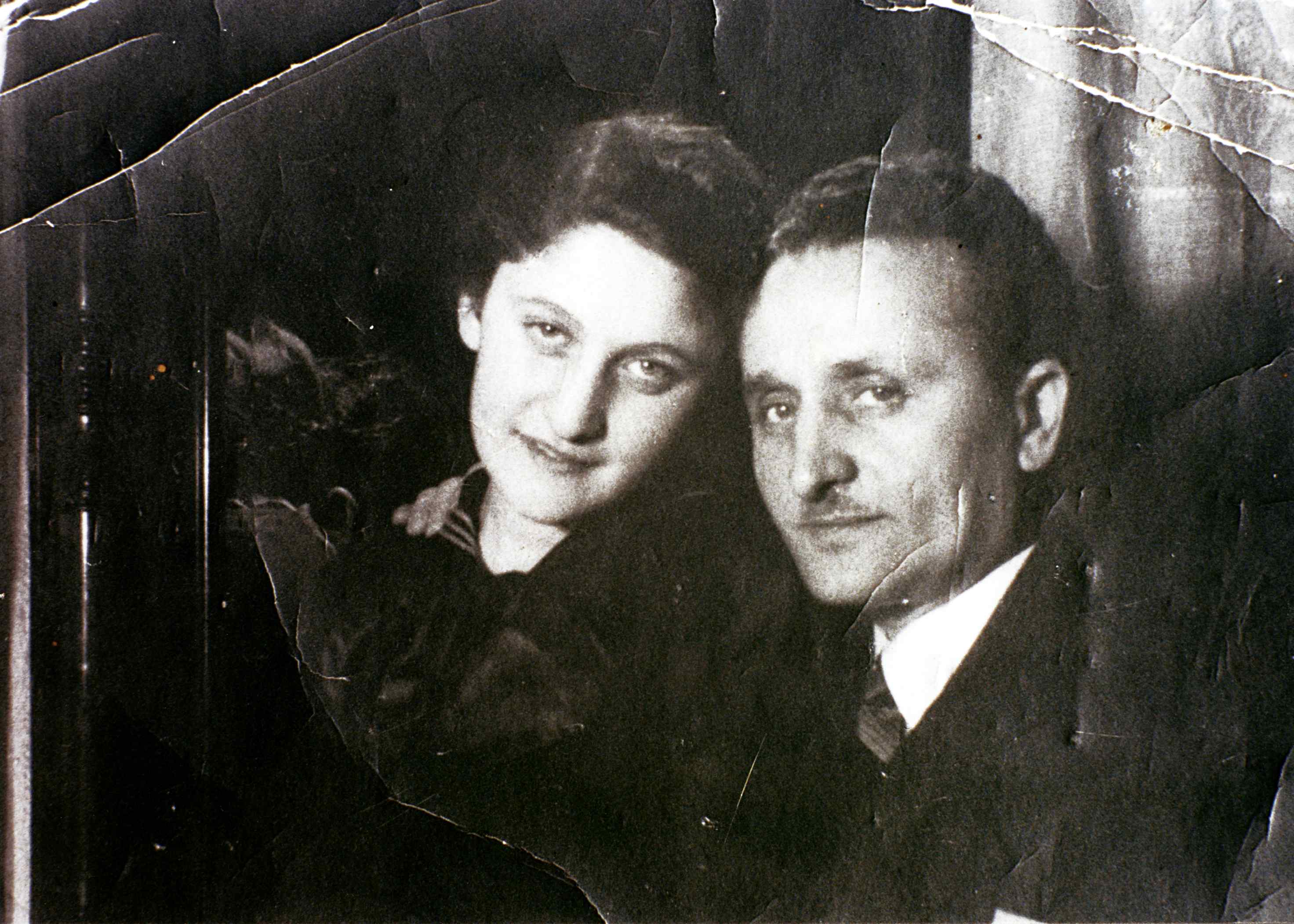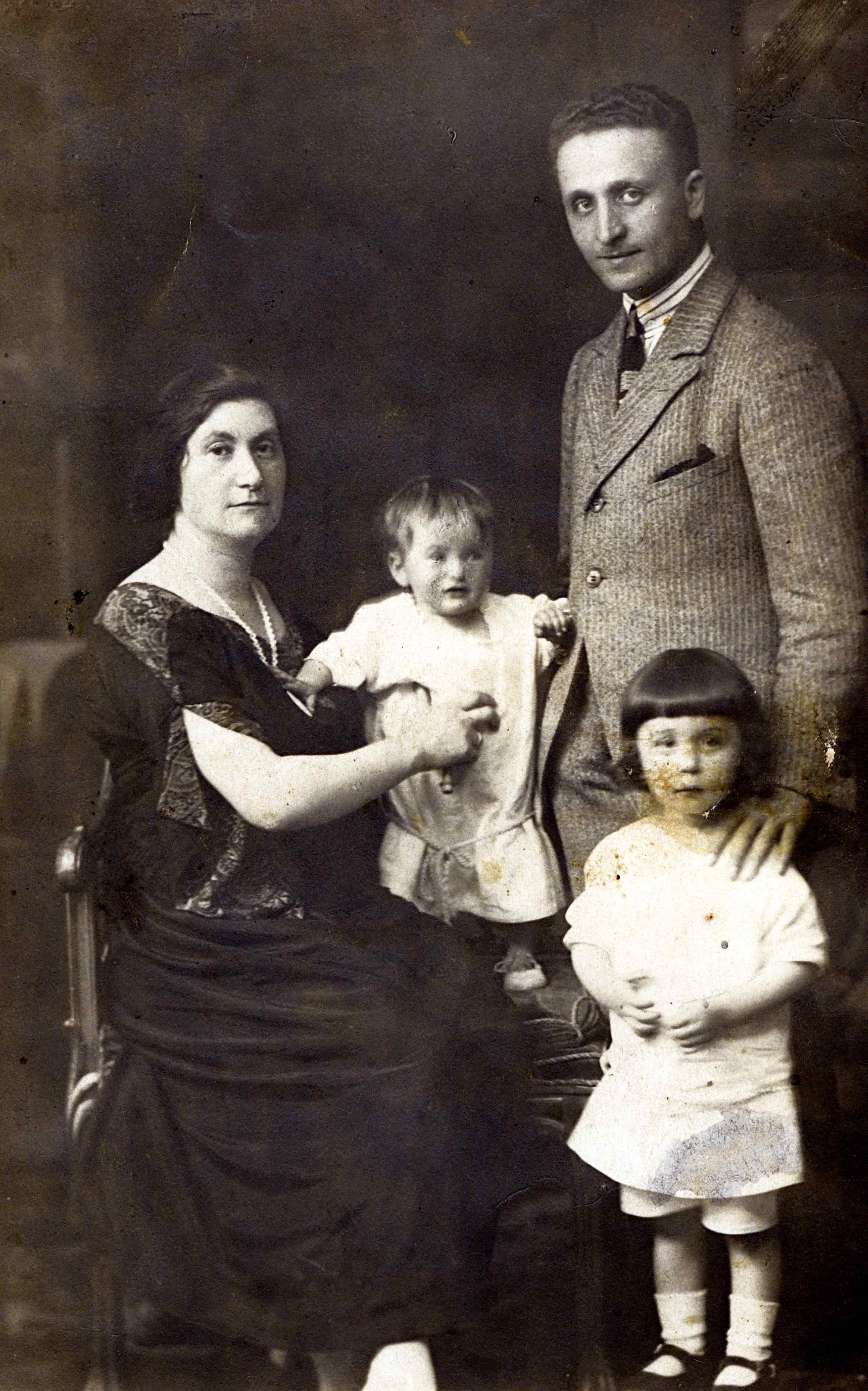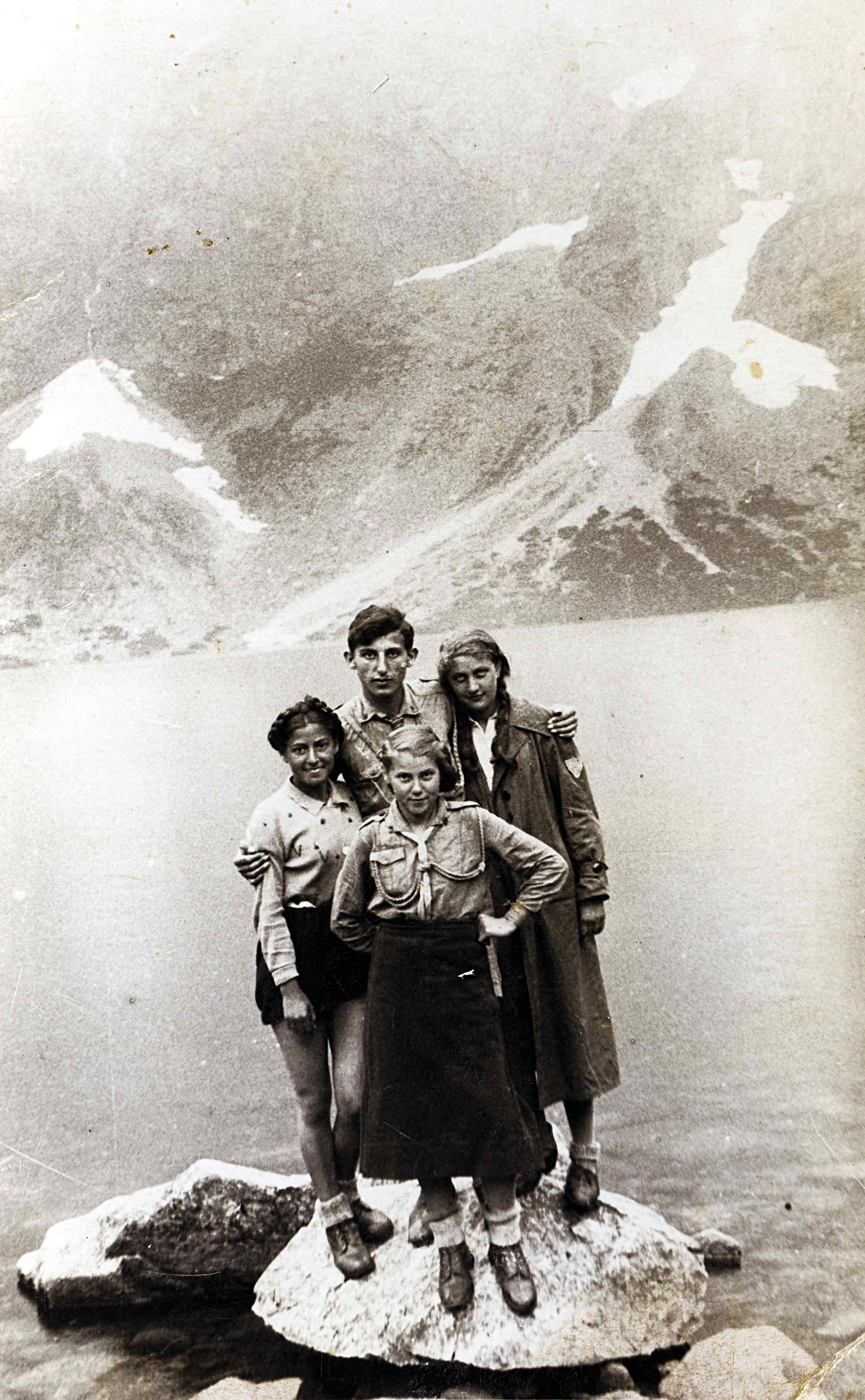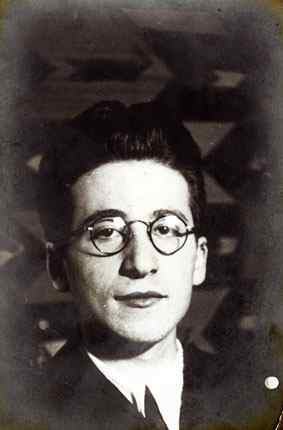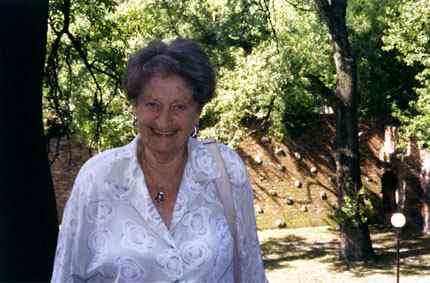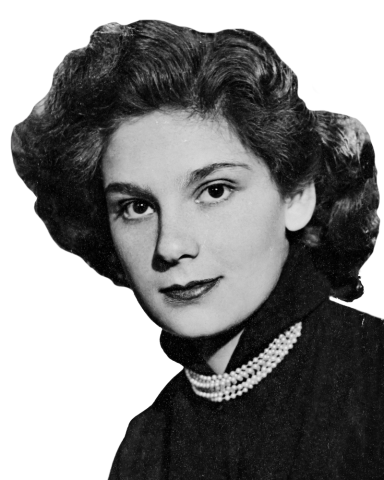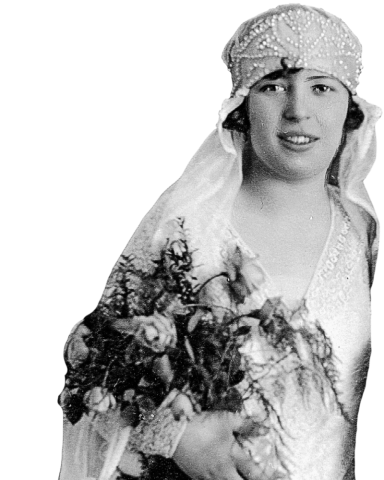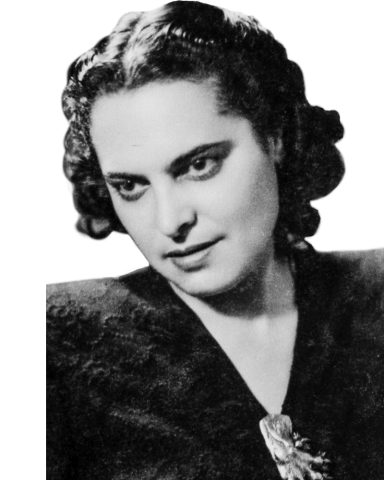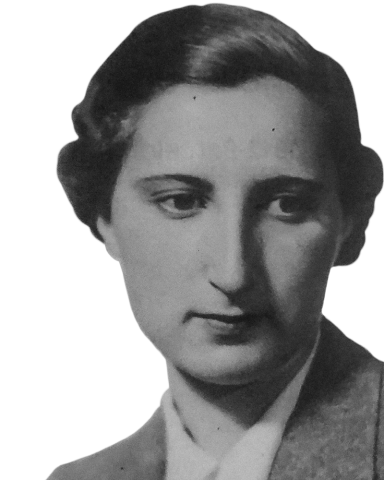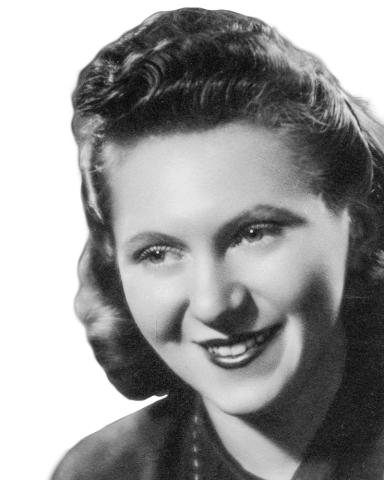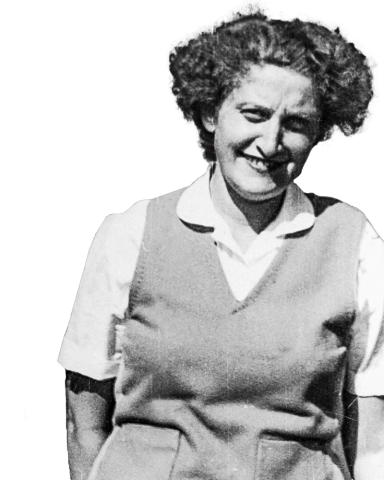
Irena Wygodzka
My name is Eni Wygodzka, nee Beitner. Erna was the name used in documents, in the identity card, but both my friends and family always called me Eni. One of my cousins used to call me Koziula [from the Polish word ‘koza,’ meaning goat], because I was kind of wild and restless, skipping around on one leg.
Interviewer: Zuzanna Schnepf
Warsaw, 2004
Family background
My name is Eni Wygodzka, née Beitner. Erna was the name used in documents, in the identity card, but both my friends and family always called me Eni. One of my cousins used to call me Koziula [from the Polish word ‘koza,’ meaning goat] because I was kind of wild and restless... Irena, that was only after I returned to Poland, in 1947.
Irena with her father Herman Beitner
Father’s family came from Dąbrowa Górnicza and mother’s from Będzin. I only remember one grandfather from my father’s side. My grandparents had a hardware store... It must have been a family business. My mother’s maiden name is Londner. Her parents died early; I didn’t know them at all. Mother’s father had a store in Będzin, also a hardware store, that’s all I know. It’s very likely that the families of my parents met through business – these hardware stores. There was a double marriage between the two families. First, Tobiasz, my father’s brother, married Mania, my mother’s sister. And at this wedding, my mother must have met Tobiasz’s brother. They must have fallen in love, but somehow Mother never talked about it. Those were families who hardly made ends meet. That’s what I think.
Mother’s name was Bala, but officially, in documents – Bajla, I think. But she’d also sign her name Balbina. ‘Balcia,’ I remember, that's how my father called mom. When they were speaking Yiddish to each other, Mother would call father ‘Hershel,’ but when they were speaking Polish – Herman.
The Beitner Family in 1923
I remember how Mother told me that she waited seven years, because during the First World War Father was in the army. So he was in the army between 1914 and 1918, and I think they got married in 1919, because my brother, Natan, was born in 1921 and I was born in 1922. After the wedding, my parents went to Magdeburg. There was a painful crisis [in Poland] and that’s why Father went to Germany looking for work. I think it must have been 1920.
Childhood, growing up, religious life and education
When I was two years old, my parents returned to Poland. We went to Katowice. That’s where my two sisters were born, Zosia and Jadzia [Jadwiga]. In Katowice, my father was a real estate manager.
Mother was always worried that she didn’t have enough money. As I remember it, it wasn’t so bad… But I remember that my parents always talked about being in debt. Mother took care of the house, there were four children, so there was a lot of work. There were no luxuries. There was one servant. She was always a Pole. The servants would come and go, for different reasons.
We spoke Polish at home. My parents also spoke German and Yiddish. We, the children, spoke Polish and German. The only book which I remember we had at home was in Polish. It was Tolstoy, I remember... My parents didn’t read much. They didn’t have an intellectual education or intellectual needs, no needs. They were simple people. My parents’ friends were Jews. We didn’t have any close relations with Poles. The three nationalities in the city: Poles, Jews and Germans were not close. Jews met with Jews, and the others probably with their own.
Mother’s food was kosher. My parents celebrated the traditional holidays: Pesach, Chanukkah, Purim. Mother lit candles on Fridays. When she lit the candles, she’d say the prayers, but she didn’t pray in other situations. She didn’t go to the synagogue much, she was no religious fanatic. Father went to the synagogue, but only on holidays, not on Fridays. Not every week, like those religious Jews. He didn’t wear a beard, he was more progressive. We didn’t do anything on Sabbath. That’s when guests would come visit. But I don’t think we obeyed all those restrictions. We cooked, we turned the lights on, but I don’t think we travelled. We weren’t allowed to eat ham, but my friends and I would often buy a ham sandwich and eat it at the gate. I was never religious. I remember I attended the synagogue only on High Holidays and we played in the gardens around the synagogue. I remember my brother debated religious issues with our father and tried to prove to him that God didn’t exist, that it had all been made up by people. And we, girls, didn’t care much about religion.
I was six years old when I started attending the Berek Joselewicz Elementary School. It was very close to our home… Well, I wasn’t such a good student. Once I even had to repeat a grade, 6th grade. Yes, I failed mathematics and physics. I remember that it really hit me hard. My parents didn’t punish me at home. They were sorry, just like I was. So I repeated 6th grade and graduated from that elementary school after eight years, because there were seven grades in all. I started attending gymnasium when I was 14 years old [1936]. It was a vocational gymnasium of the Polish Women’s Association in Katowice. An all girls’ school. We learned sewing, corsetry. I didn’t want to work in that profession, but my parents sent me there. Since I wasn’t such a great student, they sent me to a vocational school so I’d learn a trade.
Father was a member of the General Zionist Organization. He was the treasurer there. My parents wanted to move to Palestine, but they never had enough money for the tickets, to go with the entire family. So we never left. Zionist views were popular among my father’s brothers. Mother wanted us to leave, but she wasn’t a member of any Zionist organisation.
My brother Natan was smarter and more talented than I. I kept arguing with Natan all the time. We became very close later, we liked each other very much. Natan didn’t want to go to Palestine, like our parents and me. He didn’t want anything to do with Zionism, he was more of a communist.
Irena Wygodzka with her friends from Akiba in Zakopane
I was nine years old [1931] when I joined the Zionist organization, and I remained a member until the end. My friends encouraged me to do it. My parents didn’t have anything against it. I joined Akiba. In Akiba we’d meet, learn Hebrew, sing some songs in Hebrew. It was quite fun. We wanted to leave for Palestine. Studying, discussions, camps – all of this prepared us for emigration. They told us about Palestine... They talked to us a lot about morality, pride, and love of the Israeli land. When I was 12 or 13 years old I went to camp for the first time. I went to camps with Akiba, perhaps once with Ha-Noar. My parents didn’t like this very much. They had to pay, it was expensive. But I always somehow managed to convince them.
There were discussions about current events, political and sexual issues. Those discussions made me conscious [of sexuality]. I was very young then, 12-13 years. What did we know then? Nothing. Our parents didn’t tell us anything. I didn’t date. I didn’t fall in love easily, well, even if I did, it was platonic. There was this Moniek Fajner. He was from Będzin. Moniek Fajner left for Palestine in1937, I think. He wrote letters to me, he was in love with me, but I didn’t write him back.
The Second World War and the Holocaust
Perhaps a day before the war broke out, we ran away from Katowice, because we were afraid of the Germans. Everyone was running away, not just Jews. But no one was counting on how soon they’d catch up with us. We were somewhere near Olkusz, Wolbrom. [Then we returned] to Sosnowiec, to my mother’s sister [Mania] and my father’s brother [Tobiasz], that is, to my closest relatives.
And then this horrible occupation started. I was a rebellious girl, so I decided to run away. I didn’t tell my parents anything. And my brother and I, we decided to go to Lwów, to the Russians [Soviets]. This was still in September 1939. So we left home, we walked and walked, sometimes we’d get a ride on some horse-drawn wagon. We reached Kraków. It turned out we didn’t have any money. So my brother went back to Sosnowiec to earn some money. He returned with Father [from Sosnowiec to Kraków]. Father had decided that he had to run away too, because he was the manager of those tenement houses where so many Volksdeutsche lived and, although he was a very decent man, he still had enemies… And from then on we travelled together. My mother and sisters stayed in Sosnowiec, with uncle and aunt. We passed Przemyśl, we swam across the River San at night, crossed over onto the Soviet side and went to Lwów.
Natan Beitner, Irena's brother, in 1930s
So I spent the first few months of the Second World War in Lwów. At first, I’d call the situation dramatic. There were lots of refugees from across Poland. Father finally rented a room from the Seweryns. It was a mother with a son and a daughter. They were Poles. Very nice and decent people. Natan wanted to enrol in a technical secondary school, but they didn’t want to admit him because he was a ‘bieżeniec,’ [from Russian: refugee]. In Lwów, he saw what real communism was like and he came to understand that it had all been falsified, not true. He kept to himself, he didn’t have any friends. When I left [Lwów for Vilnius], he was practically all alone. He didn’t have a good relationship with Father. Natan committed suicide in 1940.
I went to a kibbutz in Vilnius in December 1939. My brother walked me to the train station. I didn’t tell Father that I was leaving because I was afraid he wouldn’t let me go. I wrote to him, and Father somehow forgave me. I went to the kibbutz because I wanted to leave for Palestine... It was all quite illegal; papers were arranged in [Soviet] Russia.
In the spring of 1941, I received a letter from Mom, sent from Sosnowiec to Vilnius. The letter arrived in the mail, normally. Mom wasn’t clear about it, but she wrote that she was sorry she would never see Natan again. How did she know what happened? I think Father must have written her something. And Father hid Natan’s death from me… When I got this letter, I asked my friend Dudek Goldberg, who was going to Lwów, to find out exactly [what happened]. Then he brought me the news that Natan had committed suicide. That’s when I went back to Father, to Lwów, it was May 1941. The war between Germany and Russia broke out a month later. Dudek Goldberg also went to Lwów. He was my first love: Dudek Goldberg from Radom. I met him in Vilnius, in the kibbutz. We were together in Lwów for a short time. Later, the war broke out, and he was conscripted into the Soviet army. C’est tout – that’s all. He died in the army. Everyone knew: they sent them all to the front without any kind of training, as cannon fodder.
After I returned from Vilnius, I settled with my father in that room at the Seweryns. A month after the Germans came in, a pogrom of Jews took place. That’s when my father died. I was also in that pogrom. I managed to get out of the prison on Lackiego Street because I showed them the document I had. The German looked at me, I was young, blond, blue-eyed, maybe I didn’t look like a Jew to him. Anyway, he read ‘place of birth: Magdeburg’ and asked them to lead me out of the prison, along with two other girls.
I was all by myself, after my father was murdered in that pogrom. When they started setting up the ghetto, I ran away from Lwów. I decided to go to my mother, to Sosnowiec. I stopped horse-drawn wagons. I remember that I made the sign of the cross each time we passed a cross, so the drivers wouldn’t think I was Jewish. I was extremely careful... I remembered I had some distant relatives in Olkusz and I went there. They gave me money, so I could have it for the bus and train fares. I bought a ticket and went to Sosnowiec.
The Germans had a detailed list of everyone who crossed from the General Government to the Reich, because all those people had to apply for a ‘Kennkarte’. The Germans summoned them to a meeting point. I received an order to show up there. We, the young ones, were sent to a labour camp. So in February 1942, I was already at the Oberaltstadt camp [a Nazi labour camp at Polish-Czech border]. Today it is called Hořejší Staré Město [now Horní Staré Město, part of Trutnov in Czech Republic]. At first, it was a labour camp. The factory produced thread. The work hours were, for example, from 2.30 am to 2.30 pm. And then you had to clean the camp, scrub the floors, do all kinds of things... We lived in horrible barracks, full of bugs. There were only girls at the camp. I became good friends with some of them.
I found out that a ghetto had been created in Sosnowiec in the following months, after I had been sent to camp. The ghetto was in Środula, between Sosnowiec and Będzin. My family was moved into the ghetto. So I started thinking about getting my mother and sisters to the camp. Meanwhile, Mother kept walking around Sosnowiec begging to be taken to the camp. Finally, someone got bored with her and put her on some transport. They managed to reach me before the final deportations from the ghetto in Środula. All the other family members were taken to Auschwitz, and they all died. I was at the camp with my mother and sisters until the end of the war. And we all survived.
After the war: family and migrations
After we left camp, I went to Salzburg for some time [to a DP camp]. Together with my mother and sisters, because we didn’t know where to go, we wanted to go to Israel [Palestine, British Mandate at the time]. In Salzburg, we lived in stables which were adapted for sleeping. From Salzburg we went to Germany.
I met my husband in Germany, still in 1945. My husband was from Będzin. His name was Szyja, Stanisław was his pen name before the war. Stanislaw was a leftist. He was self-taught, but he was a man of great knowledge. He translated from German, from Yiddish. He started writing in the 1920s. He was in Auschwitz, Oranienburg, Sachsenhausen, Dachau, Freiman [place not identified] – he was liberated there in 1945, he was sick with tuberculosis, taken to hospital. We got married on March 11, 1946, when he was discharged from hospital.
Irena and Stanisław Wygodzki after the war
Both my sisters and my mother went to Palestine straight from Germany. I wanted to go to Palestine, too, but my husband, who was a Polish writer and a communist, believed his place was in Poland. He had fought for this socialism his entire conscious life, and when it came in Poland, he wanted to keep on building it. When we were getting married, my husband put forward this condition – that we would go back to Poland. And I agreed, because I loved him. People were leaving for Palestine, for America, going to all kinds of places. Nobody was going back to Poland, because they knew there was antisemitism there.
So we arrived in Warsaw. My husband was working at the Ministry of Culture for some time, later only at home. All he’d do was write. I worked until the birth of my son. In 1952, I gave birth to Adam. Later to my daughter, Ewa. She is three years younger than Adam. I wasn’t a traditional Jewish housekeeper. I brought my children up in a secular manner. I told them about their heritage. My husband and I never concealed our identity. My husband never wanted to go to Israel, but in 1967, he decided to go. Antisemitism knew no limits then. We left in 1968, in January. The entire period preceding our departure was horrible. We were followed, our phone was being tapped. Even our son wanted to leave, because he had experienced antisemitism at school… My daughter experienced antisemitism, too.
In Poland, my husband used to earn money in one specific way – he published books. But in Israel you wouldn’t receive much even for writing that was published. We had to get by somehow, so I studied for nine months at a school for beauticians in Tel Aviv. At first, I waited for a long time, almost for a year, for my first customers. I worked very hard, I had learned how to work hard in Poland. I had lots of customers later. My husband used to write a bit. And he started working for Yad Vashem [Holocaust museum, archive and memorial in Jerusalem]. He prepared definitions for Encyclopedia Judaica for them and he also edited memoirs. My husband was displeased with many things in Israel: their attitude to Arabs and those Orthodox people, their power in the country. When there were elections, we always used to vote for the Labor Party. He missed Poland very much, he missed his friends and his past. He never really belonged anywhere...
Irena and Stanisław Wygodzki at the Sea of Galilee
Then problems with the children began. They were in a different world, climate, mentality, everything was foreign to them. Although they tried to plant their roots there, it wasn’t working out. My son had decided to leave Israel for good [in 1975 or 1976]. He married a Swiss girl [in 1985]. They travelled all over the world. They have been to India, New Zealand, Jamaica, South America. Their daughter, her name is Sunshine, was born in New Zealand. After some time in Spain, my daughter met a Frenchman whom she married. They’ve been living in the south of France for ten years now, they have two daughters.
My husband died in 1992. I stayed in Israel for many years afterward. Finally, I decided that if I wanted to keep in touch with my children, I should go to Europe. I decided I’d never return to Israel. In 2000, I decided to go to my daughter [to France]. But it turned out I wasn’t feeling well there. So I decided to go to Warsaw, see how it would be here, whether life would be possible, because I had never imagined I’d return to Poland after I left [in 1968]. So I got here, here I am and I’m not doing too badly. Not good, because I don’t feel ties to Israel, Poland or France. I’m somewhat suspended, neither here nor there. I am an Israeli citizen, I don’t have a Polish passport. Polish citizenship was taken away from me. I could try to regain it, but I’m not sure if it’s worth it. I’m also put off by the same things I was put off by in Israel. For example, fanatics, who are the same everywhere. So this is all difficult, especially since I’m alone. I know I don’t have much time until the end, so I’m happy every time my son or daughter come and visit me. There are quite a few people I can talk to from time to time. For example, from literary circles. I don’t participate in the life of the Jewish religious community in Warsaw. I never have. I don’t see why I should begin now. I read a lot. Mostly about the Holocaust. I somehow can’t leave the past behind.
Irena Wygodzka in 2004
